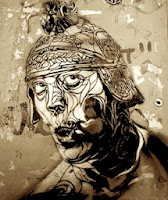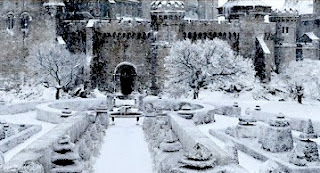In the cruel city of Rome, founded on its seven hills, in the reign of Diocletian, Saint Sebastian died.
The charcoal fires were burning in every courtyard in the city, for the night was cold and dark and sifting snow. But deep beneath the Emperor’s palace, bound in irons, there was no fire to warm the Christian martyrs, who shivered, chains rattling, waiting for death to come. Very late that night, or it may have been very early in the morning, a figure moved through the streets, wrapped in a black cloak that the wind seemed not to touch. This figure, he made no sound; he left no trail. He floated through the falling snow like a specter, and came to a darkened doorway that gaped like a hungry black throat; it swallowed him up.
Inside the prison, each torch gasped out as he moved by. And as each was extinguished, the darkness grew, and the Christians in their chains soon realized, something was coming. The figure stopped before them, one torch remaining, and raised a shadowed hand to its cowl. He pulled it back; he was Sebastian, a soldier in the Praetorian Guard. In the early morning hours, he often brought the Eucharist to those doomed to die that day, for he shared their faith, and he tended to those who were captive.
 But this morning, of all mornings, someone had seen him come, and quickly the report was carried to the Emperor. And so, that evening, Sebastian found himself in the prisoners’ place, in the captives’ cell, in the chains reserved for an outlawed faith.
But this morning, of all mornings, someone had seen him come, and quickly the report was carried to the Emperor. And so, that evening, Sebastian found himself in the prisoners’ place, in the captives’ cell, in the chains reserved for an outlawed faith.The Emperor barked the command, and Sebastian was tied to a silver tree by his former comrades. The famed Muritanian Archers were called, who stood, each in his place, who drew their bows as one, who let their arrows fly. Blood flowered at each wound; it pooled at his feet and steamed in the snow, and Sebastian was soon as full of arrows as an urchin is full of pins. The soldiers took his body from the palace; they threw it out, into the street.
In the frozen night, a she-wolf stalked the seven hills. She gave a howl that echoed through stony streets. The white snow fell, and soon wrapped Sebastian’s body as a shroud. And it was there that Saint Irene came upon him, and set about to prepare him for burial. Yet as she cleaned his wounds, she realized that he still was breathing, a crystal cloud in the frozen air. The ghost still inhabited his body.
Irene nursed him back to health; she bound his wounds and sewed his flesh. And the moment he could stand, Sebastian returned feebly to the Emperor’s palace to stand upon the stairs when the Emperor would descend.
 As Diocletian came to his marble steps, he beheld Sebastian leaning against the fluted rail, his flesh a pallid hue, body stitched together with thread as an old quilt. A pale fire burned in the saint’s eyes. “A ghost,” the Emperor said to himself, “or very much worse . . . a zombie!”
As Diocletian came to his marble steps, he beheld Sebastian leaning against the fluted rail, his flesh a pallid hue, body stitched together with thread as an old quilt. A pale fire burned in the saint’s eyes. “A ghost,” the Emperor said to himself, “or very much worse . . . a zombie!”Sebastian began to move toward him, and gave a groan from the pain.
“Yes,” thought Diocletian, “assuredly a zombie.”
When the Emperor’s bodyguards saw Sebastian shambling forward, each drew his gladius and they closed ranks. “My liege,” said one, “is this not Sebastian, whom you had killed?”
“Indeed,” said Sebastian, “but the Lord recalled me to life.”
“To life?” spat Diocletian. “Nay! You may not be dead, but you are certainly not alive. ‘Undead,’ I name thee!”
The soldiers exchanged puzzled looks.
 “The Lord recalled me to life,” continued Sebastian, “that I might meet you here and tell you this: what you do is wrong, when you persecute the servants of Christ, for they do not seek your harm, but pray daily that God would bless you.”
“The Lord recalled me to life,” continued Sebastian, “that I might meet you here and tell you this: what you do is wrong, when you persecute the servants of Christ, for they do not seek your harm, but pray daily that God would bless you.”The Emperor scoffed. “What are you prattling on about? You should barely be able to form words; the extent of your vocabulary should be ‘Uuuuh’ and ‘Braaains’. You’re the most talkative zombie I’ve ever met.”
“What’s a zombie?” asked one of the soldiers, a certain Milton by name, from the region of Cappadocia.
“Nevermind,” replied the Emperor, “an anachronism. Just don’t let him bite you.”
“Bite us?”
“I don’t want to bite anyone,” said Sebastian.
But Diocletian had made up his mind. He gave the command and had Sebastian martyred a second time. He ordered his soldiers to use clubs and cudgels, until his body was undone. “And then, make sure you cut off his head,” he warned.
 “That’s not excessive?” asked Milton.
“That’s not excessive?” asked Milton.But they did it anyway, and when Sebastian’s body was thoroughly broken, and his head removed, and his ghost truly departed, what was left of him, they threw into the sewers.
And it is for this reason that Sebastian is the patron saint of martyrs, and of archers, and against plagues, and most of all, against the impending zombie apocalypse.
Sebastian Faust lives (exists?) in Nashville, Tennessee with his dog Watson, who died when a car struck him 22 years ago. He’s had several roommates who have disappeared under mysterious circumstances, never to be heard from again. And all he wants to do is eat your brains. You can follow Sebastian on Twitter, but we wouldn’t recommend it; in fact, we’re not going to disclose that information.
You can follow On Pop Theology on Twitter @OnPopTheology or like us on Facebook at www.facebook.com/OnPopTheology.
You might also like:


No comments:
Post a Comment